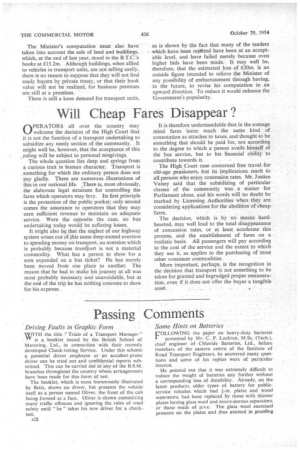Will Cheap Fares Disappear ?
Page 34

If you've noticed an error in this article please click here to report it so we can fix it.
OPERATORS all over the country may welcome the decision of the High Court that it is not the function of a transport undertaking to subsidize any needy section of the community. It might well be, however, that the acceptance of this _ruling will be subject to personal misgivings.
The whole question lies deep and springs from a curious trait in -human character. Transport is something for which the ordinary person does not • pay gladly. There are numerous illustrations of • this in our national life. ;There is, most obviously, the elaborate legal structure for controlling the fares which operators may levy. Its first principle is the protection of the public pocket; only second comes the assurance to operators that they may • earn sufficient revenue to maintain an adequate • service. Were the opposite the case, no bus undertaking today would be suffering losses.
It might also be that the neglect of our highway system arises out of this same deep-rooted aversion to spending money on transport, an aversion which is probably because transport is not a material commodity. What has a person to show for a sum expended on a bus ticket? He has merely been moved from one place to another. The reason that he had to make his journey at all was most probably necessary and unavoidable, but at the end of the trip he has nothing concrete to show for his expense. It is therefore understandable that in the average mind fares incur much the same kind of connotation as attaches to taxes, and thought to be something that should be paid for, not according to the degree to which a person avails himself of the bus service, but to his financial ability to contribute towards it. — • The High. Court case concerned free 'travelfor old-age pensioners, but its implications reach to all persons who enjoy concession rates. Mr. Justice Vaisey said that the subsidizing of particular classes of the community was. a matter for Parliament alone, and his words will no doubt be marked by Licensing Authorities when they are considering applications for the abolition of cheap fares.
The decision, which is by no means hardhearted, may well lead to the total disappearance of concession rates, or at least accelerate this process, and the establishment of fares on a realistic basis. All passengers will pay according to the cost of the service and the extent to which they use it, as applies to the purchasing of most other consumer commodities.
More important, perhaps, is the recognition in the decision that transport is not something to be taken for granted and begrudged proPer remuneration, even if it does not offer the buyer a tangible asset.




























































































